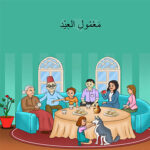
How to teach kids Arabic in a fun way using music, story telling, games, art, crafts, interactive apps, and fun activities! Below are 7 interesting ways!
Teaching Arabic to kids in a fun way involves a variety of methods and tools, just like teaching any other language. Here are some methods that can help make the learning process enjoyable and engaging:
Games and Activities:
Games are a great way to help kids learn. You can use traditional board games and modify them to include Arabic vocabulary or phrases. Flashcards, memory games, word search puzzles, and picture matching activities can also be very helpful. We love this Lebanese bored game 7Zar Shou? Lebanese Charades is a card game that is your traditional charades with a Lebanese twist.
2 or more teams compete trying to act out & guess as many cards as possible. The team with the most points wins.
We are so excited to announce the new edition of 7zar Shou Lebanese Charades (135 cards):
more famous sayings, more categories & now with English Translation for non-Lebanese to join in on the fun!.
Storytelling:
Use Arabic children’s books or fairy tales to tell stories. This method can be both fun and educational, helping to build vocabulary, comprehension, and listening skills. Check out our children stories written in the Levantine dialect.
Songs and Music:
Songs are an effective way to teach a new language because they make learning enjoyable. Arabic nursery rhymes, songs, and even children’s music videos can be great resources. Our students enjoy watching and listening to Lila TV.
Crafts and Drawing:
Children love to draw and do crafts, and you can incorporate Arabic into these activities. For example, you can have them draw a picture and then label it with the corresponding Arabic words.
Interactive Apps:
There are several educational apps available that are designed to teach kids Arabic in a fun, interactive way. These can be particularly useful for learning vocabulary and basic phrases.
Dramas and Role Play:
Children learn effectively when they are actively engaged. Setting up dramas or role-play scenarios where they have to use Arabic can be an entertaining and practical way for them to learn.
Cultural Activities:
Introducing kids to Arabic culture can make learning the language more interesting and meaningful. This could include cooking Arabic food together, celebrating Arabic holidays, or exploring Arabic art and history.
Remember, children learn at their own pace, and what works best will depend on the child’s individual learning style, interests, and abilities. The goal is to make the learning experience enjoyable so that they will stay interested and motivated
